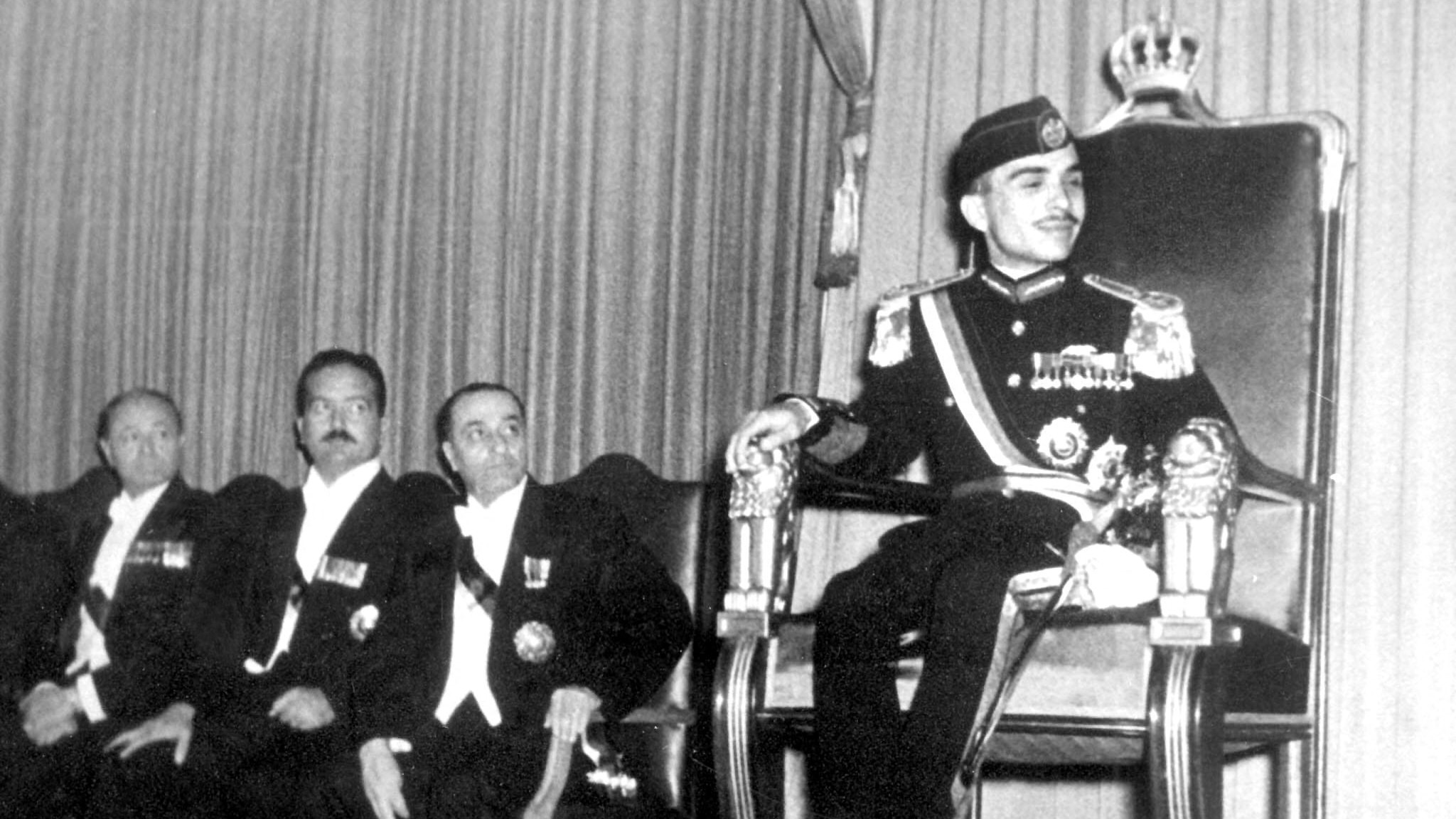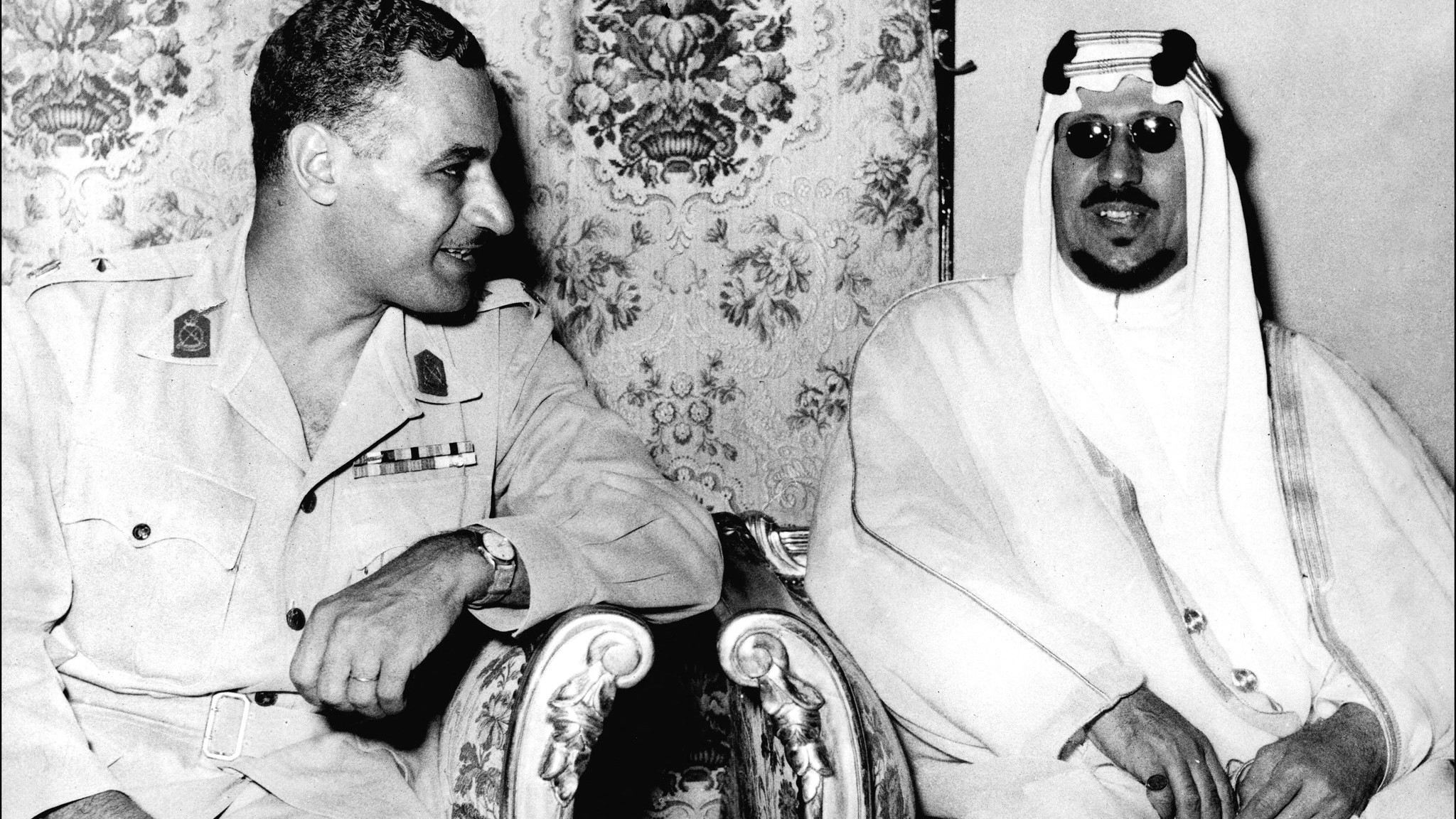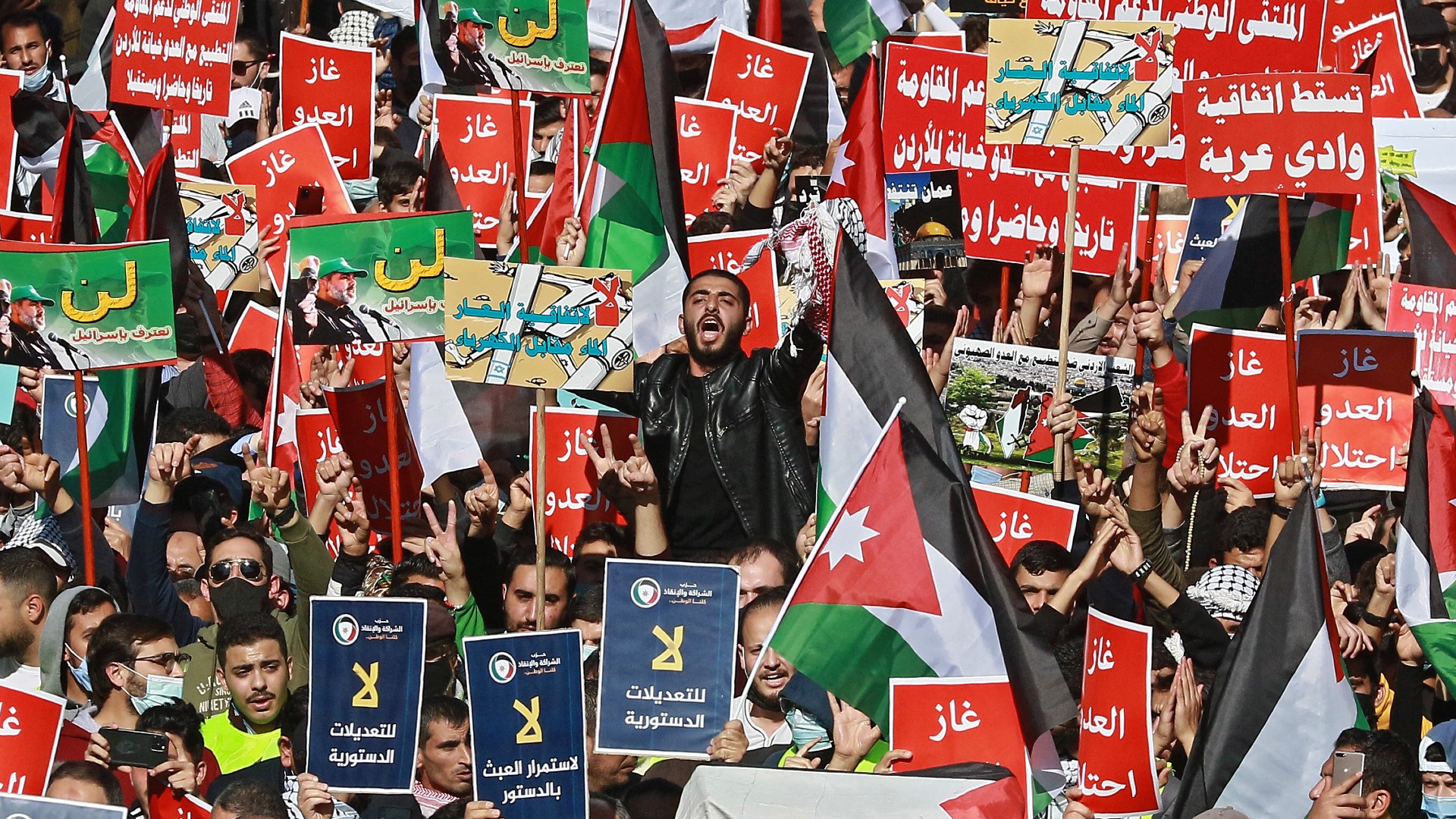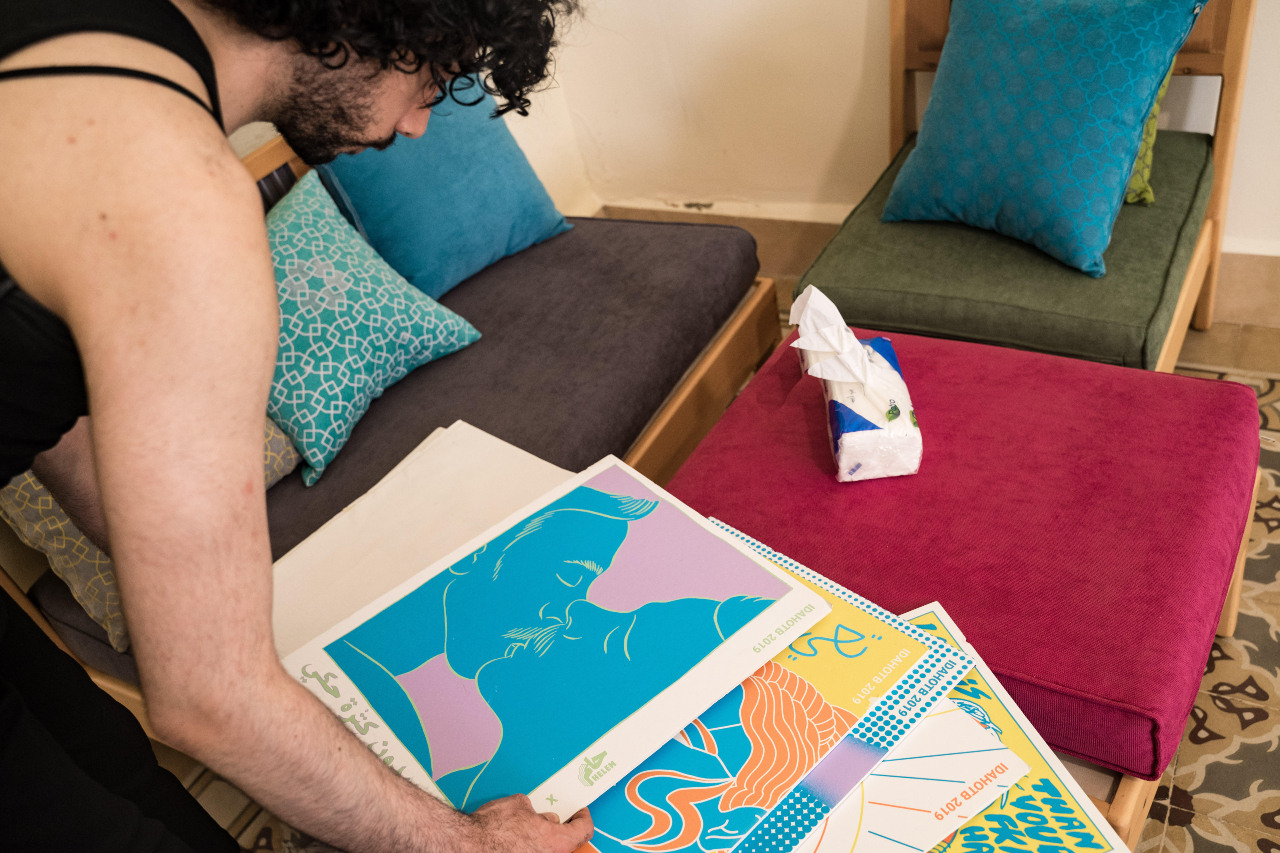In contrast to the 1950s anti-imperialist mobilisations against the Baghdad Pact, today the Americans and Jordanian king are confident in their plan to create a new military alliance with Israel
Joseph Massad
28 June 2022

King Abdullah II of Jordan stands for a photo with members of the US Senate at the US Capitol in Washington DC on 10 May 2022 (AFP)
US alliances have not changed much in the last seven decades.
In recent weeks, an active effort by the US and Israel to bring about yet another military alliance between Israel and a number of Arab countries against Iran has been afoot.
A few days ago, Jordan’s King Abdullah announced on US television that he “would be one of the first people that would endorse a Middle East Nato.” He added: “I’d like to see more countries in the area come into that mix.”
What Abdullah did not say explicitly is that Israel would be part of that mix. The Americans, however, have been more forthright.
A White House spokesperson stated that the US "strongly support[s] Israel’s integration into the broader Middle East region, and this will be a topic of discussion when the president visits Israel."
Meanwhile, Jordan has been not only working with Nato as the king averred, but it is also home to a number of extra-sovereign US military bases and facilities, over which it has no jurisdiction or control by virtue of the 2021 Defence Agreement the monarch signed with the Americans without parliamentary approval.
A new alliance
Days before the king made his comments, Israel’s Defence Minister Benny Gantz announced that Israel was joining several Arab countries to form a new US-led joint air defence network, called Middle East Air Defence Alliance (MEAD).
Jordan is expected to be part of this joint air defence network. As King Abdullah is an absolute ruler and need not answer to anyone inside his country, he can make and unmake policy as he pleases.
This does not mean that internal opposition to the new alliance will not emerge, but rather that the king is certain that his security agencies can neutralise any serious dissent quickly.
Biden Middle East visit: Why an Israel-led security pact is a paper tigerAndreas Krieg
Such a military alliance aimed specifically at Iran, as well as Syria, Hezbollah, and Hamas, and belatedly at Russia, is not a new idea, although more formal arrangements are underway this time than previously.
In 2006-2007, US Secretary of State Condoleezza Rice hoped that the new Middle East to which she, on behalf of the US, wanted to give birth, would include a US-led military alliance. At the time Rice was able to recruit Saudi Arabia, Egypt and Jordan to her new pact, but the times were not auspicious to fully and openly include Israel.
It was, however, John Foster Dulles, as secretary of state under President Dwight Eisenhower, who was known for his "pactomania." His many efforts to establish military pacts around the world included the creation in 1955 of the Central Treaty Organisation or CENTO, better known as the Baghdad Pact, as the main anti-Soviet front in the Middle East.
Besides Britain, Turkey, the Shah’s Iran, Pakistan, and Hashemite Iraq, the Americans worked hard to enlist Jordan but failed due to nationalist anti-imperialist opposition to King Hussein’s wishes. The pact was opposed not only by Nasser's Egypt but also by then anti-Hashemite Saudi Arabia.
General Gerald Templer, Britain’s imperial chief of staff, visited Jordan on a mission to sell the pact to its rulers.
The king and his prime minister, Hazza’ al-Majali, supported the venture, while the anti-colonial nationalist tide in the country, as well as Jordan's Muslim Brotherhood, vehemently opposed it. In the Jordanian army, then led by British Lieutenant-General John Bagot Glubb, an anti-imperialist group of “Free Officers” opposed the pact.
They insisted that the enemies of Jordan were the British and Israel and not the USSR.

Due to the massive demonstrations opposing the British and Jordan’s joining the Baghdad Pact, the army was deployed in Jordan’s cities and began to shoot at civilians. While al-Majali's cabinet was forced to resign, a number of demonstrators were killed by the army.
Police were pelted with stones as were British army officers, and Jordanian crowds burnt army Land Rovers. Protests took place all over the country. Aside from the West Bank, East Bank cities and towns from Amman and Zarqa to Irbid, Salt, Ajloun, ar-Ramtha, and even the village of Anjara were full of demonstrators.
One of the British officers in Zarqa, Lieutenant Colonel Patrick Lloyd, was killed by a mob while his entire army regiment stood by watching without firing a shot. Zarqa police refused to enforce the curfew and released violators arrested by the army. To regain control of Zarqa, military aircraft flew over the town for reconnaissance, terrifying the population.
A nationalist tide
The episode strengthened the anti-imperialist nationalist tide in Jordan and led to Glubb’s expulsion in March 1956.
Between 1954 and 1957, Jordan had an active political life, with a lively, relatively freely-elected anti-imperialist parliament, and in 1956-57, it had a nationalist and anti-imperialist prime minister, Suleiman al-Nabulsi. But the Jordanian anti-imperialists’ victory was short-lived. The US did not take the defeat of its plans for the pact lying down.

Why Israel's leaders and allies are in a state of panic over its future
In January 1957, President Eisenhower announced the Eisenhower Doctrine. He declared that the US would come to the aid of any country in the Middle East threatened by communism.
In his speech setting out his doctrine, the president declared that: “The Middle East is the birthplace of three great religions - Muslim, Christian and Hebrew. Mecca and Jerusalem are more than places on the map. They symbolise religions which teach that the spirit has supremacy over matter and that the individual has a dignity and rights of which no despotic government can rightfully deprive him. It would be intolerable if the holy places of the Middle East should be subjected to a rule that glorifies atheistic materialism."
In private meetings with the CIA’s Frank Wisner and the Joint Chiefs of Staff, Eisenhower insisted that the Arabs should obtain inspiration from their religion to fight communism and that “we should do everything possible to stress the ‘holy war’ aspect.” The plan was for the US to support new “reformist” groups like the Society of the Muslim Brothers and shun traditional clerics.
Later that year, during a palace coup by King Hussein against the democratically-elected parliament, cabinet and army officers, members of the Jordanian branch of the Society of the Muslim Brothers, according to to the memoir of Jordanian free officer Shahir Yusuf Abu Shahut about the period, Army and politics in Jordan, published in 1992, joined the Jordanian army units’ campaign of repression in fighting the anti-imperialist nationalist and pro-democracy forces in the country whom they dubbed "communists".
But according to Muslim Brotherhood sources, the claim that they were part of the campiagn of repression against nationalists at the time is 'outright wrong'.
A palace coup
The king justified the palace coup by claiming that there was an army plot to overthrow him, although the Jordanian chief of staff, Ali Abu-Nuwar, who fled the country during the palace coup, explained in a press conference that "the alleged [anti-king] plot was planned and designed by the American embassy in Jordan and by collaborators with colonialism in order to reach their goals."
Eisenhower was keen on propping up the Saudis as a counterweight to Abdel Nasser
Immediately following the palace coup, the army was purged of all anti-imperialist and nationalist elements and was restored to the status quo ante which prevailed under Glubb Pasha. Jordan, as a result, suffered under martial law from 1957 until 1992.
The Saudis, who had been the traditional enemies of the Hashemites, had also sided with Egyptian President Gamal Abdel Nasser against the western-created, anti-Soviet Baghdad Pact. The US state department decided "to detach Saudi Arabia from Egyptian influence".
Eisenhower was keen on propping up Saudi Arabia as a counterweight to Abdel Nasser, especially as the Americans recognised the importance of Saudi control of Muslim holy places.
Eisenhower’s plan was for the Saudi king to "be built up, possibly, as a spiritual leader. Once this were accomplished, we might begin to urge his right to political leadership."

As King Saud seemed less responsive and not fit for the role, in May 1962, Crown Prince Faysal (who, with the support of the Americans, forced his brother King Saud to abdicate in 1964 and replaced him on the throne) organised an international Islamic conference in Mecca to combat the popularity of anti-imperialist Arab nationalism, socialism, and “secularism,” and launched the Muslim World League.
This was part of the new role that the US subcontracted to Saudi Arabia under King Faysal against Abdel Nasser during the Cold War.
But this was in the 1950s and 1960s.
Today we live in a world where there are no longer major anti-imperialist forces in the Arab world. Indeed, there are no signs that anyone in the US-equipped Jordanian military, let alone in Jordan’s political class, espouses any anti-imperialist nationalist inclinations as was the case in the 1950s.
However, there are those whose hostility to anti-imperialism is such that they still seek to undermine the credentials of the 1950s anti-imperialist Prime Minister al-Nabulsi.
A new Middle East
A few weeks ago, perhaps as part of a campaign to force Jordanian public acquiescence in the new Middle East Nato, former Jordanian prime minister, Samir al-Rifai, attacked al-Nabulsi and accused him of having plotted with foreign powers in the 1950s to overthrow the Hashemite regime.

Another effort, perhaps also designed to help convince Jordanians that Iran, and not Israel, is their enemy, includes stories circulated last month in the press that Iranian cyber-espionage tried to hack Jordan’s foreign ministry.
More serious are the allegations that Iran is behind a major campaign of smuggling drugs to Jordan from the Syrian border.
Iran, in fact, maintains friendly diplomatic relations with Jordan, despite the former closeness of the Jordanian regime with the pre-revolutionary dictatorship of the Shah, and King Hussein’s active support in the 1980s of Saddam Hussein’s war on revolutionary Iran.
Another effort designed to help convince Jordanians that Iran, and not Israel, is their enemy, includes stories that Iranian cyber-espionage tried to hack Jordan’s foreign ministry
Whereas the British generals unleashed the British-trained Jordanian army on civilians in the mid-1950s, they did so in a Jordan that was mobilised against continued British colonialism, US imperialism, and the Israeli enemy.
Still, the anti-imperialist forces at the time were successful in preventing King Hussein from joining the Baghdad Pact.
Indeed, if the Society of the Muslim Brothers was part of the coup against the nationalists in the 1950s , a few days ago, along with other Jordanian patriotic groups, it came out strongly against the new pact.
Today, the US and King Abdullah, however, do not appear to be worried that the US-supported and equipped Jordanian army, let alone Jordan’s formidable US-supported security agencies, will face any 1950s-scale popular mobilisation against the new Middle East Nato-in-the-making, and that no Jordanian prime minister will need to be toppled nor will the need arise for a palace coup to be organised.
Both the Americans and the king seem at ease with their new plan and confident in its success.
The views expressed in this article belong to the author and do not necessarily reflect the editorial policy of Middle East Eye.

Joseph Massad is professor of modern Arab politics and intellectual history at Columbia University, New York. He is the author of many books and academic and journalistic articles. His books include Colonial Effects: The Making of National Identity in Jordan; Desiring Arabs; The Persistence of the Palestinian Question: Essays on Zionism and the Palestinians, and most recently Islam in Liberalism. His books and articles have been translated into a dozen languages.










